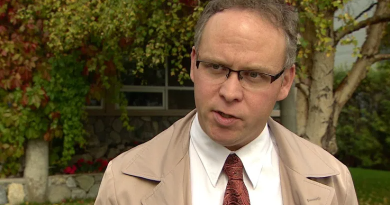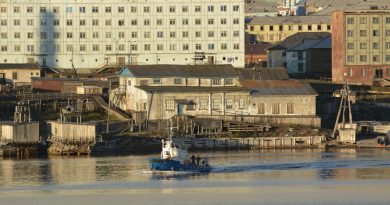What’s in a name? How a government project forced surnames on Inuit in Canada

With Project Surname, Inuit had to choose and register family names, which were not common in their culture
After a lifetime of spelling his name the way white priests and teachers told him to, in 1999 Peter Irniq finally decided to change his last name to the traditional Inuit pronunciation.
His mother named him Irniq, which means son in Inuktitut, when he was born in an igloo in 1947 on the land hundreds of kilometres from Naujaat, Nunavut. His name had come to her in a dream.
Peter Irniq, who also goes by Piita, is a former commissioner of Nunavut and a well-known guardian of Inuit culture and language. Like many Inuit, Irniq’s name has evolved and changed over the last century, as a result of colonization, residential schools and Project Surname.
Project Surname was proposed by the Northwest Territories Council (now known as the Legislative Assembly) in the late 1960s as a way to move past the federal government’s “E-number” system. Between the 1940s and 1970s, E-numbers were assigned to “Eskimos” and stamped on discs, which Inuit in the Canadian Arctic were forced to wear to keep track of census data, medical records, etc.
CBC North is doing a series on the history and significance of Inuit names. Traditional names hold great respect and honour. There are long-held Inuit beliefs that people take on the characteristics of their namesake, and that spirits live on through them. Many Inuit have close connections with the person who named them, as well as people who have the same name.
Through Project Surname, Inuit were told to choose and register surnames, or family names, along with their given name.
“My first birth certificate was Peter Ernerk, which was spelled by a Roman Catholic priest,” Irniq told CBC from his home in Ottawa.
Then his principal at Sir Joseph Bernier Federal Day School, a residential school in Chersterfield Inlet, changed the spelling to Erneck in 1958.
“So my name for a long period of time since I was born was Peter Ernerk or Erneck or E3-546.”
The name Peter was the result of being baptized by the Catholic church.
“My parents did not choose my name,” Irniq said. “Our parents did not know a thing about naming their children in the English terms or French terms.”
Initially the priest named him Pierre, but it didn’t stick, he said. French names were quite common for Inuit because many of the priests in the North were from France or Quebec.
The Anglican church, however, gave the children what Irniq called “Inukticized” names. Names like Johnny became Joanasie, David became Davidee — these names are still common among Inuit today.
Surnames introduced
Family names had not been used among Inuit for time immemorial, Irniq said, until Project Surname.
For example, Irniq did not share names with his family members: his father was Athanasi Angutitaq, his mother Irene Katak, and his sister Bernadette Iguttaq.
He said there were positives and negatives to the project.
“Project Surname was the end of Inuit culture in terms of naming our children,” Irniq said.
We are taking ownership, reclaiming our language and our culture. – Saa Pitsiulak, Inuktitut language program officer
According to a 1970 Annual Report of the Commissioner of the Northwest Territories, provided in part to CBC by a spokesperson for the territorial government, the project’s director, Abraham Okpik, visited every settlement where Inuit lived and interviewed each head of family about their wishes.
Those that wanted names to replace their disc numbers were recorded and their names were officially changed. The project involved about 12,000 people and changes were made to approximately 95 per cent of the names involved.
When Okpik visited Irniq, he chose the name his mother had given him.
“I’m a strong, strong believer in my own culture and I want to keep the name that was given to me by my mother.”
But Irniq said many Inuit took the names of their fathers, as is common in western culture. This, he said, has served to assimilate Inuit.
“We’ve joined the mainstream of the Canadian society, just like all the Joneses and all the Smiths.”
New writing system
While Project Surname was taking place, the Inuit Cultural Institute, which no longer exists, was working on a new writing system for Inuit. The system, called roman orthography, is still used today.
Under the new system, some letters were eliminated; E was replaced with I; O was replaced by U, Irniq explained.
Millie Kuliktana, from Kugluktuk, Nunavut, was named Millie at birth, and her cherished Alaskan great-uncle “gifted” her the Iñupiaq name, Qitupana.
Her name had been spelled Kitupana, but Millie, 56, eventually changed it to Q, as she said that is the proper way to pronounce it in Inuktitut.
Kuliktana, who was a cultural consultant on the Inuuqatigiit Inuit curriculum in the 1990s, said Project Surname helped do away with the E-number discs.
“It was Project Surname that helped spell the last names of the people, because the Inuit didn’t have a writing system of their own,” she said.
“So whenever they did give them their family surnames, that was really the first form of writing that they had to get used to.”
I think to this day, Project Surname was 10 years too early.– Peter Irniq
Saa Pitsiulak, an Inuktitut language program officer for Nunavut’s Department of Culture and Heritage, works to protect, promote and preserve Inuit languages.
She said the negative impact of federal schools and governments telling Inuit how to live their lives, assimilate and speak English, is still felt today. But now, Inuit are taking that back.
“We are taking ownership, reclaiming our language and our culture because it identifies who we are, where we come from and that we are Inuit,” Pitsiulak said.
“Those are barriers that were imposed on us and very painful experiences, so … it is part of the healing journey to reclaim your identity and your traditions.”
Goodbye to E3-546
In 1999, Irniq changed his family’s last name, getting rid of what he called the “old colonialistic” spelling, as well as the E-number, E3-546. In total, it cost the five members of his family $795.
“I-R-N-I-Q is what I have always been,” he said. “In 2000 I came back to who I have always been ever since I was born.”
Irniq said that because he is so well known, it was highly publicized when he changed the spelling of his name, and about 450 Inuit followed suit.
Soon after, he said Nunavut’s then-Justice minister Jack Anawak announced that Inuit would no longer have to pay to change their names or the spelling of their names as a result of Project Surname.
Irniq ultimately believes that when Project Surname came into being, Inuit weren’t quite ready to take on authorities.
“When I was born, Inuit, gee we were always very obedient of the newcomers like the Roman Catholic Church and the government, RCMP and Hudson’s Bay Company,” Irniq said.
“We were just coming out of the igloo, and the Canadian society, the Canadian system of governance, and things like that were very, very foreign to us.
“So I think to this day, Project Surname was 10 years too early.”
Related stories from around the North:
Canada: Inuktitut language education terminology developed for Inuit region of Arctic Quebec, Eye on the Arctic
Finland: Budget cuts threaten international Sámi language cooperation, Yle News
Norway: Walt Disney Animation Studios to release Saami-language version of “Frozen 2”, Eye on the Arctic
Sweden: Can cross-border cooperation decolonize Sami language education?, Eye on the Arctic
United States: Inuit leaders applaud UN move to designate International Decade of Indigenous Languages, Eye on the Arctic



